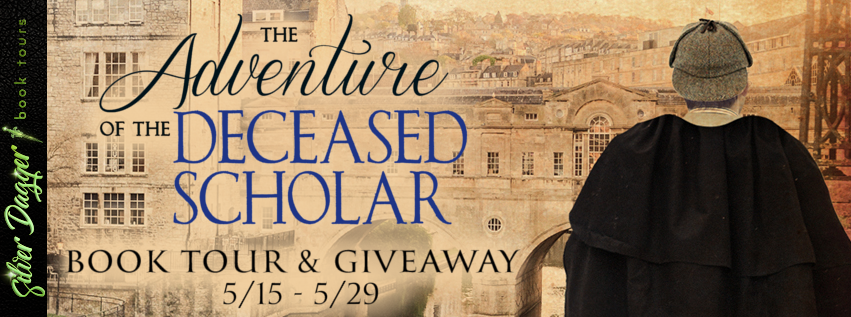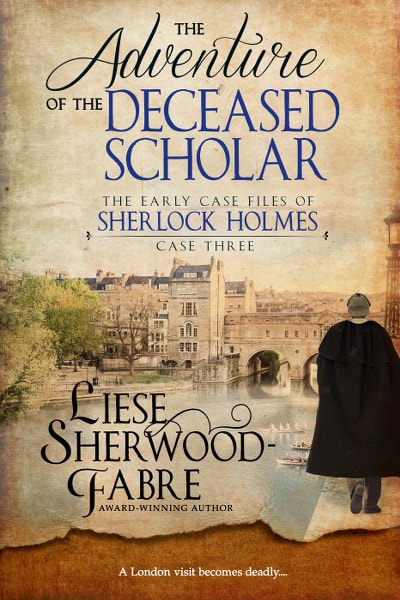The Adventure of the Deceased Scholar (The Early Case Files of Sherlock Holmes) Historical Mystery by Liese Sherwood-Fabre ➱ Book Tour with Giveaway

The
Adventure of the Deceased Scholar
The
Early Case Files of Sherlock Holmes Book 3
by
Liese Sherwood-Fabre
Genre:
Historical Mystery
Award-winning author and recognized Sherlockian scholar Liese Sherwood-Fabre’s third novel in “The Early Case Files of Sherlock Holmes” follows the young detective to London for the spring holiday. This CIBA first-place mystery and mayhem winner has been described by bestselling author Gemma Halliday as “a classic in the making” and Kirkus Reviews as “a multifaceted and convincing addition to Sherlock-ian lore.”
A
tragedy during the 1868 Oxford-Cambridge Boat race puts Mycroft
Holmes’ reputation on the line.
When
Mycroft Holmes identifies a drowning victim, he is drawn into a
situation that could destroy not only Lord Surminster's name, but his
own reputation as well. If ruled a suicide, the lord’s assets will
be returned to the Crown, leaving his mother and siblings destitute.
Should that happen, the victim’s sister has threatened to drag
Mycroft’s good name through the mire. Will Sherlock be able
determine what happened before more than one family is destroyed?
The sunlight sparkled off the swells, and, shielding my eyes from
the glare, I studied a similar crowd gathered along the opposite bank. No empty
space could be seen along that stone wall, either. So many people. All to catch
a glimpse of the boat crews as they rowed past.
Rising on my toes, I leaned over the wall, checking downstream to
my left for either boat appearing around the river’s bend.
“Quit fidgeting,” Mycroft said out of the side of his mouth.
I opened my own to protest, but Mother rebuked him first.
“Really, Mycroft.” She fanned herself, although I doubted it did
much to cool her. “You can’t blame him. If this race doesn’t start soon,
Sherlock and I are leaving. I’ll not have either of us collapsing because of
the lack of oxygen in this crowd.”
My brother crossed his arms over his chest and gave a little
snort. I could almost hear the protests swirling around in his brain. He
hadn’t been the one to decide to come to London for the second part of the
season. Or suggest we attend the annual Oxford-Cambridge boat race. Or
insist it was time for him to begin attending some of the season’s balls and
parties as a country squire’s first son. After all, Father had remained at
Underbyrne to attend to business affairs for the estate, and we could have too.
Before he could actually express any of these or other sentiments
out loud, a far-off shout sent a wave of excited chatter among those
surrounding us. Finally, the boat race had begun. Cheers and shouts of
encouragement moved up the bank as the boats passed the spectators. Those about
us jostled and pushed on all sides, making me feel a little like the flotsam
bobbing along in the waters below.
Mycroft bounced on the balls of his feet. While his idea of
exercise consisted almost exclusively of strolling between buildings at
Oxford—from his rooms to the dining hall, the rented room over a tavern he and
some friends used for their Diogenes Society meetings, or to the occasional
lecture—I was impressed with both his interest in the race and the exertion he
expended in this display of enthusiasm.
“How long before we can see them?” I asked, glancing down the
river again.
“The whole race is about twenty minutes,” my brother said without
taking his eyes from the same spot where I focused. “We’re about halfway along
the course, so I would estimate eight to ten minutes before they appear.”
Ten more minutes of strangers’ elbows in my ribs? I wasn’t sure
anything was worth such torture.
“Excuse me, Mr. Mycroft Holmes?”
The feminine voice made us turn to face a pair of women who had
somehow managed to push through the press to our position. They were obviously
mother and daughter. Both had the same straight-backed-chin-raised bearing,
light brown hair and tipped-up noses. The older woman wore a dark dress that,
while fashionable, lacked any flourishes, indicating the final stages of
mourning—not yet ready to leave her weeds completely behind. The younger woman,
however, wore a pale lavender dress and a jaunty hat on top of a pile of curls.
Mycroft stared at the two, a hesitation broken by my mother’s
cough. I coughed as well, but to cover my amusement. That these two ladies
seemed to know my brother and had shocked him into silence gave me a certain
delight. Only the opposite sex ever seemed to ruffle my brother—my mother
being, of course, the exception.
At my mother’s cue, he appeared to shake himself free of whatever
had stunned him and bowed at the waist. “Forgive me,” he said when he
straightened. “We’ve only been introduced once, Lady Surminster, Miss Phillips.
Allow me to introduce my mother, Violette Holmes, and my brother, Sherlock.
This is Lord Surminster’s mother and sister.”
“Lady Surminster, how wonderful to meet you,” Mother said. “You
too, Miss Phillips.”
The older woman glanced at her daughter before saying, “We
recognized you as one of Vernon’s classmates and were hoping—”
The younger woman seemed unable to restrain herself. “Vernon is
missing.” She turned to Mycroft. “Have you seen him?”
My brother pulled back his chin and dropped his mouth open. A
second later, he snapped it shut and shook his head vigorously. “I’m afraid
I’ve been here all weekend. With my family.”
“But here lies our concern,” Lady Surminster said. “He was
supposed to meet us here in London as well. We've been in contact with some of
his other classmates, and none has reported seeing him since Thursday. We were
hoping he might have been staying with a friend.”
Mother placed a hand on the other woman’s arm. “I’m sure he’s
simply enjoying the sights of London. He may even be back home by now.”
She shook her head and glanced away, as if to avoid us seeing the
worry creasing the corners of her eyes. “We would have heard. I insisted a
servant find us immediately if he appeared.”
Her daughter’s mouth drew down, and a line appeared between her
eyebrows. “Which is why we came here. We thought he might perhaps be viewing
the race. And why we sought you out, Mr. Holmes.”
“Mycroft can make some enquiries for you among his classmates. I’m
sure we’ll have word soon enough.”
“Our address in town is Saint Abel Lane. Number Seventy-four.
Please, if you learn anything, let us know.”
“Of course. I would suggest it best to go home and wait. Young men
in spring often enjoy kicking up their heels a bit.”
Before either could reply, the crowd’s shouts had us all turn to
watch the first boat pass in front of where we stood.
“That’s Oxford. I told you we’d win.” Mycroft shifted his gaze in
the direction they’d just come. “Cambridge is just now passing the bend.”
A bit of pride for Oxford swelled within me. Because my father’s
plan involved me attending the same university as Mycroft, I already felt a
certain affinity for the school. While I still hadn’t completed my first year
at Eton and, at fourteen, had five years before I would enter university, I
couldn’t suppress a smug grin at the much-less-enthusiastic cheers flowing
through the crowd as the “Light Blues” of Cambridge rowed by.
Another shout downstream followed after the second boat moved on.
My breath caught in my throat when I realized the crowd’s emotion was
different. Instead of cheers, screams punctuated the rumbling. Some rushed in
the direction of the noise while others appeared to be moving just as quickly
away. One young man wearing Oxford colors ran from the bank, caught sight of
Mycroft and waved him over to his side.
My brother actually jogged to his classmate and even faster
back to us. A rock formed in my stomach. The lack of expression in his face
indicated this was no ordinary event, and most likely involved Oxford in some
manner.
“Lady Surminster. Miss Phillips,” my brother wheezed out upon his
return. “There has been an incident. An accident, from what I was told. It has
been recommended those of a delicate nature leave the area. I assure you I’ll
make enquiries and get back to you about Lord Surminster.”
The younger woman glanced toward the river and the melee of
people. Almost all of the women and children were heading toward the street.
She turned to her mother. “Perhaps it would be best,” she said. “Come. Let’s
leave before the crush of people makes it impossible to return home.”
After Mycroft’s reassurance one more time he would seek out any
knowledge of the whereabouts of Lord Surminster, they took their leave.
Once they were gone, Mother turned to Mycroft. “Should I go down
to the accident? I know there are most likely doctors in the crowd, but perhaps
I can be of assistance.”
Mother had participated in medical classes in France, and she
tended to most of the family illnesses and injuries. As a result, I trusted her
more than those who formally practiced in our village.
She took a few steps in the direction where people were still
fleeing or converging, but Mycroft stopped her.
“There’s no need, Mother.” She arched her eyebrows when she faced
him. “The person was drowned. The police have been summoned.”
“But Lord Surminster? We might spot him in the crowd.”
“Again, not necessary.” The flatness in his voice warned of the
dire news about to come. The rock in my stomach grew heavier. “The drowning
victim was wearing Lord Surminster’s suit. The man who waved me over recognized
it.”
“Oh, dear,” Mother whispered.
She glanced at the spot where the crowd had gathered and then
toward the street where his family had headed. Her fan flew in her hand. With
the crowd now dispersed, the air had cooled, but the flush in her cheeks
suggested she wasn’t experiencing it. My mother wasn’t a fainting woman. I’d
watched her sew wounds and fight off a murderer. But this news had somehow
affected her differently.
The rock in my stomach was now a boulder threatening to pull me
down. I checked my brother. The composure he’d displayed with Lord Surminster’s
family had dissolved, and he now chewed on his lower lip as he studied my
mother’s pale face.
Without waiting for any direction from either of them, I reached
out and cupped her elbow. My movement spurred my brother to do the same on her
other side. Together we led her to a small bench nearby. The sight of boot
marks on the wooden slats made me grimace, but I decided Mother would forgive
us if we soiled the back of her skirt—and it would be preferable to her
swooning face-down onto the ground.

Two Years at Oxford
Although
he never mentioned the name, Sherlock shares with Dr. Watson that he spent two
years “at university.” By the 1870s, several universities offered higher
education to those not members of the Church of England. “Going to university,”
however, referred only to Oxford or Cambridge—the only two universities in
England providing the classical education directed at the upper classes. Given
that Sherlock showed a lack of knowledge about the Cambridge campus in one
tale, Sherlockians have surmised that he must have attended Oxford.

The university is actually
a federation of “colleges” (currently 38), all of which offer similar courses
of study with their own lecture halls, housing, and dining facilities. They are
distinguished from one another by each having a unique “flavor,” that caters to
different populations. For example, Jesus College at Oxford was founded for
Welshmen. One of the most well-known colleges at Oxford is Christ Church, which
began as a monastery before becoming a seat of learning under Henry VIII. Its
residents have included Albert Einstein, 13 British prime ministers and Lewis
Carroll. The Christ Church dining hall served as the model for the one at
Hogwarts.
While
“at university,” young men’s daily schedule involved chapel attendance every
day, meeting a few times a week with a tutor (a fellow, or teacher, at the
college) to discuss an essay or other work prepared by the student, attending
the occasional lecture, and a great deal of social time with other students,
including sports.
The two
schools are often equated with one another, referred to in the combined term of
“Oxbridge,” but a deep rivalry actually exists between them. Perhaps the most
public friction between the two is the annual Oxford-Cambridge boat race on the
Thames occurring in each spring since 1826 (with some exceptions, such as the
two World Wars and the pandemic). The 2021 boat race was relocated from the
Thames due to Covid restrictions, and Cambridge won, bringing them to 85 wins
over Oxford’s 80.
This
boat race is the backdrop for my latest young Sherlock Holmes mystery, The
Adventure of the Deceased Scholar. A body is found after the race, and when
Mycroft identifies the victim as a classmate, the whole family is pulled into
yet another mystery to solve.
I’ve not
attended a boat race, but I’ve attended other sporting events where rivalries
have a deep history and can imagine how strong sentiments run (such as my alma
mater TCU and SMU football teams who battle for an iron skillet). What about
you? Ever attended a grudge match of some sort?
![]()

Liese
Sherwood-Fabre has won awards for her thrillers, romance, and
literary short stories, and NYT bestselling author Steve Berry
describes her writing as "gimmick-free, old-fashioned
storytelling."
In
the second grade, she knew she was destined to write when she got an
A+ for her story about Dick, Jane, and Sally's ruined picnic. After
obtaining her PhD from Indiana University, she joined the federal
government and had the opportunity to work and live internationally
for more than fifteen years. She draws upon these experiences to
endow her characters with deep conflicts and emotions.
Website
* Facebook
* Twitter * Bookbub
* Amazon
* Goodreads
Follow the tour HERE for special content and a giveaway!
$15
Gift Card (winner's choice--Amazon or Apple)







Good morning!
ReplyDeleteThanks for hosting!